Covid-19: More than 100,000 vaccine doses administered in NI
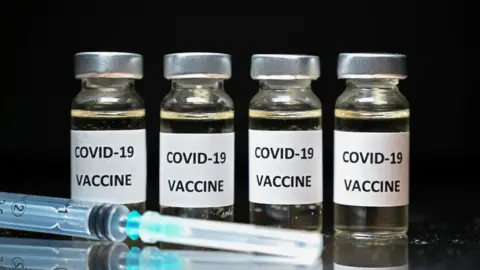 Getty Images
Getty ImagesMore than 100,000 Covid-19 vaccinations had been issued in Northern Ireland by Tuesday evening, Robin Swann has said.
The health minister said, of that figure, 91,419 people had received their first vaccine dose.
He added that 95% of care home residents had received their first dose and about 20% of those aged over 80 have received their first dose.
It comes as leading GP said the goal to begin a mass vaccine rollout by summer is "achievable" but hinges on supply.
The Department of Health published its plan to deliver vaccines in Northern Ireland on Tuesday.
Dr Alan Stout said the timeline was "very sensible" but was "almost 100%" dependent on getting enough of the vaccine.
At Wednesday's health briefing, Mr Swann said the programme had made a "strong start" but there was more to do.
He also said he has decided to issue tighter visiting guidelines for hospitals.
"I have ensured visiting will be permitted to hospices and care homes, but visits to general medical wards will no longer be permitted from this Friday", he said.
The minister added that the measure would be kept under constant review.
Mr Swann also confirmed a new rapid test for Covid-19, which can return results in 12 minutes, would be used in emergency departments.
He said a pilot programme has been carried out using the LumiraDX nasal swab, which will enable health staff to "very quickly identify patients who do not have Covid-19".
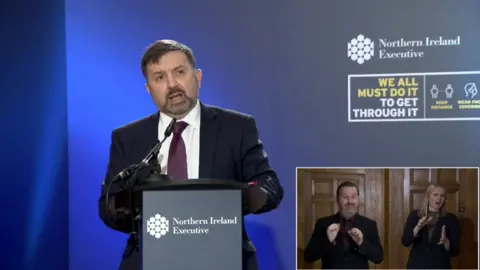
He also repeated that the current lockdown restrictions were working and had helped to reduce NI's rate of infection, but warned the executive would still have "difficult decisions" to take in relation to decisions about whether to extend some restrictions in the coming weeks.
On Wednesday, a further 19 Covid-related deaths were announced by the Department of Health in Northern Ireland.
A further 1,145 new cases of the virus were also reported.
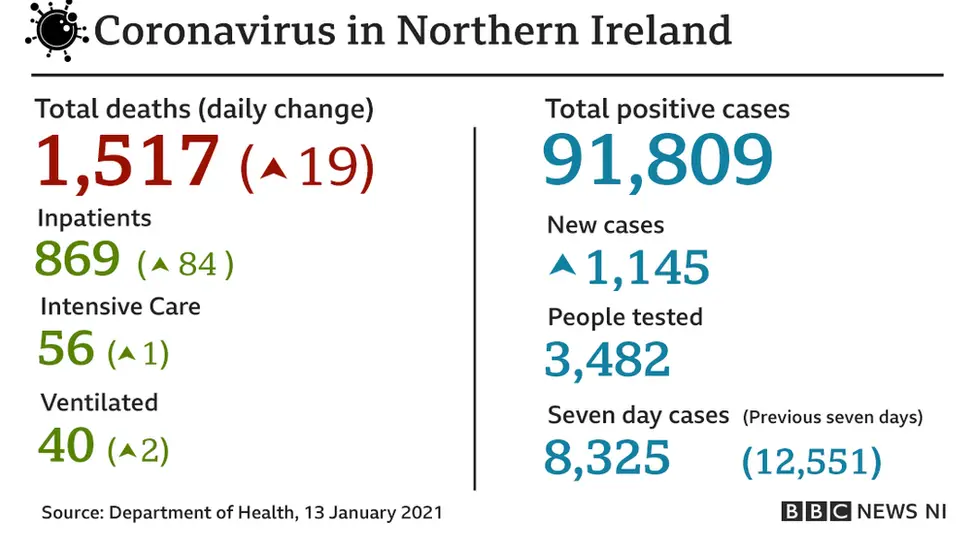
Meanwhile, Northern Ireland's chief medical officer warned there was "no doubt" that levels of the new, more transmissible variant of coronavirus are rising in Northern Ireland.
Speaking at Stormont's executive briefing, Dr Michael McBride said that the new variant was making the job to contain it "twice as difficult".
The new variant is said to be up to 70% more transmissible, but there is no evidence it is more dangerous.
The first confirmed case of the new strain was detected in Northern Ireland on 23 December, but officials had said levels in Northern Ireland remained lower than in other areas of the UK.
Dr McBride said there would now be situations where the variant could spread, where previously it may not have.
"We need to be extremely cautious in the weeks ahead," he warned, adding that the virus would not "magically disappear" on 6 February, when the current lockdown is due to end.
Stormont ministers have to review the regulations on or before 22 January, with that scheduled for next Thursday.
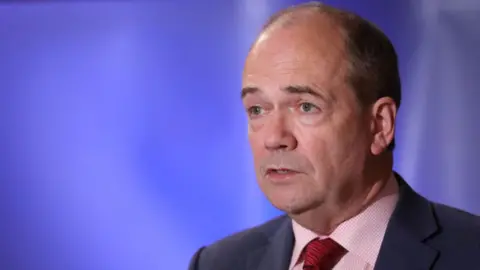 Pacemaker
PacemakerDr Stout, the chair of NI's GP committee, said practices needed another 22,000 doses to finish vaccinating people aged over 80.
Speaking to BBC's Good Morning Ulster, he said he was "very confident" the next doses would come through shortly.
"I have been overwhelmed by the desire of practices, the determination just to get going and the one thing we need to give them is vaccine - we need to get the supply in as quickly as possible.
"This is such a good news story that everybody wants the vaccine and everybody wants to give it."
The plan is for the vaccine to be given to the general population in summer 2021.
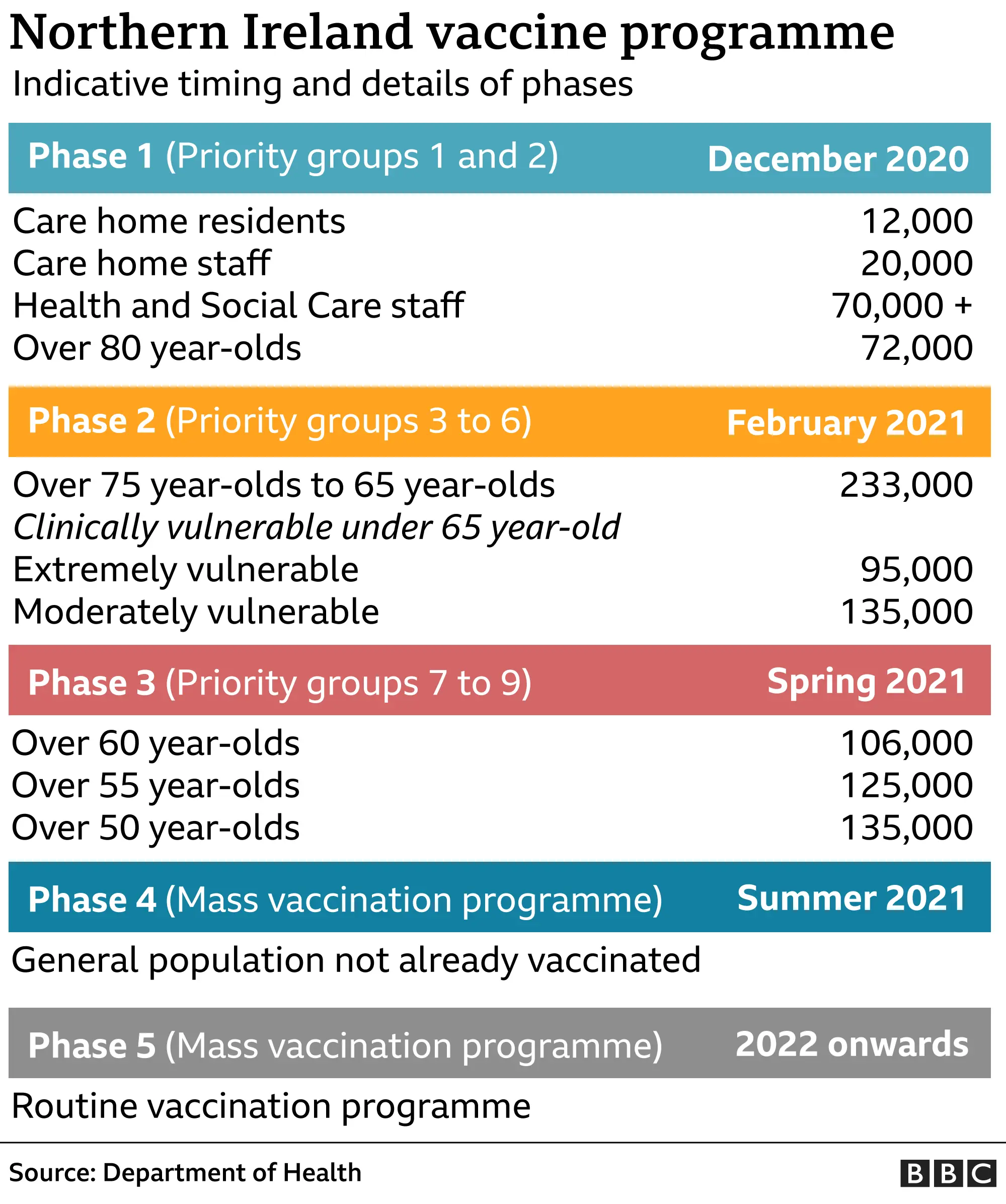
GP clinics should have received their first delivery of the vaccine by Tuesday.
Responding to reports in The Daily Telegraph that GPs administering the vaccine in England had been asked to "slow down" to let other regions "catch-up", Dr Stout said Northern Ireland had taken a different approach to how it rolled out vaccines to GPs.
He said vaccines were shared among all practices in Northern Ireland.
"We just don't have the full amount of vaccine in practice to give. We could have given all of the vaccine that a certain number of practices needed to start with but there were issues with inequality and discrimination ... so that's why an amount has gone to every single practice, so at least they have some."
